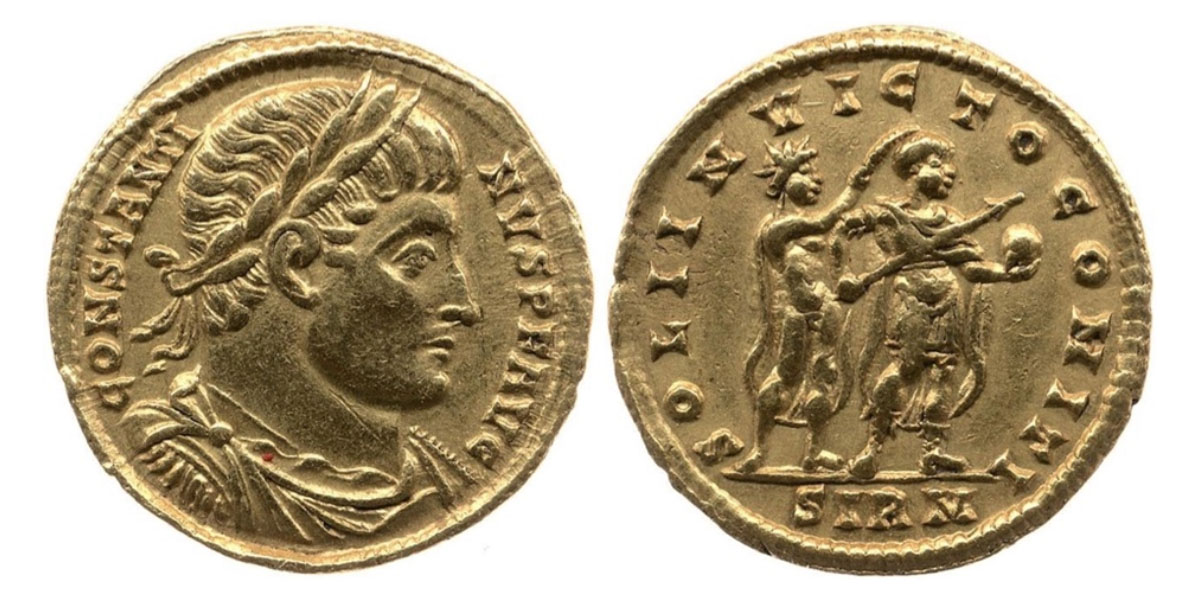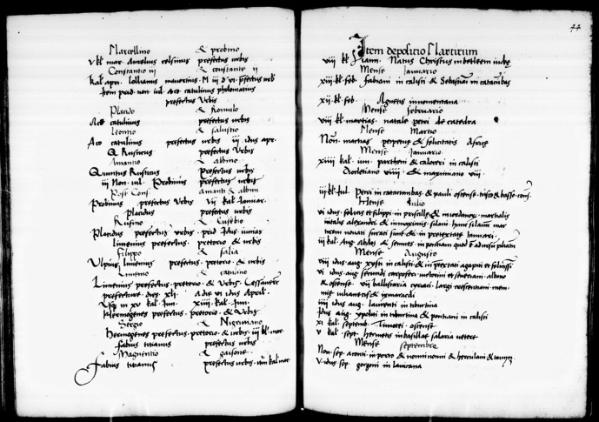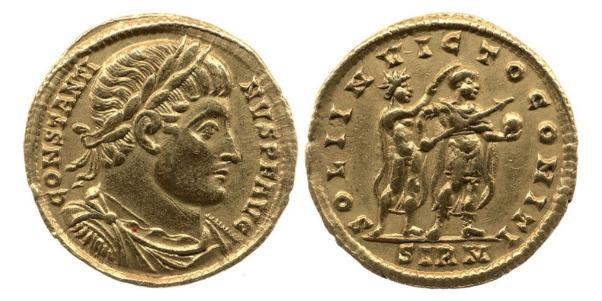
Dr. Robin Whelan who teaches on HIST260: Are You Not Entertained? Games and Festivals in the Christian Roman Empire, discusses the mysteries surrounding the origin of Christmas in this blog post.
In 354 a Roman aristocrat named Valentinus commissioned a book of calendars. The original version of this beautifully illustrated manuscript is now lost, but its contents are known from various medieval and early modern copies. One of the many wonderful things about the Codex Calendar of 354 (as it is generally known) is a single line in a section of the calendar titled ‘The Burials of the Martyrs’ (Depositio Martyrum). This list of Christian saints’ festivals in the city of Rome starts with a notice of a different sort of celebration.
‘On the eight day before the kalends of January [25 December], Christ was born in Bethlehem in Judaea.’

Vienna ÖNB MS 3416, fol. 44r can be accessed fully here.
This is the first known reference to a Christmas festival. It’s generally thought that this calendar was first produced in 336, as it is associated with the previous calendar (the ‘Burials of the Bishops’) which was first put together in that year. The Codex Calendar provides precious evidence that the church of Rome was celebrating Christmas in the second quarter of the fourth century.
When, why and how this festival developed is a mystery. As Philipp Nothaft has noted, the 25 December was one of various potential dates chosen by learned third-century Christians when seeking to figure out when the stories of the Bible and of Jesus’ life had happened. But, critically, the spur for such calculations of his birthday was the related computation of Passover and Easter—there is no sense from these Christian intellectuals that Christmas was celebrated as a festival in their Christian communities.
The Codex Calendar was commissioned four decades after the conversion of the emperor Constantine to Christianity. The first appearance of Christmas in a Rome now ruled by Christian emperors has led to (often rather conspiratorial) speculation. One suggestion which appears again and again at this time of year is that it was placed on 25 December deliberately to supplant one of the winter festivals celebrated by those who followed the traditional cults of the Roman world (the people fourth-century Christian bishops called ‘pagans’). Two obvious candidates are the raucous celebrations of the Saturnalia (dedicated to Saturn) slightly earlier in the month, or the anniversary of the Unconquered Sun (Sol Invictus) on 25 December itself. The cultural association between Christ and the attributes of the sun—as well as intriguing connections between Sol Invictus and the sort of Christianity practised by Constantine—makes some kind of association plausible. But any account of a deliberate imperial plot to substitute a pagan festival for a Christian one founders, not just on the lack of evidence, but also the difficulty of getting fourth-century bishops to agree on anything--never mind a major change to the liturgical calendar.

Coin of Constantine from Sirmium, 321 CE: reverse shows Sol Invictus crowning Constantine with the legend ‘SOLI INVICTO COMITI’, ‘COMPANION OF THE UNCONQUERED SUN’.
If its origins are unknowable, we know much more about how Christmas spread. A recent article by Robert Edwards in the Journal of Ecclesiastical History has traced its journey to the Greek East. Its move there was perhaps surprisingly belated: the birth of Jesus was celebrated on Epiphany (6 January) until the late 370s or early 380s. Sermons from Gregory of Nazianus in Constantinople and Gregory of Nyssa in Cappadocia c. 380 are the first indications of the celebration in the Greek East; likewise, in a sermon delivered in Antioch in Syria in 387, the turbulent priest John Chrysostom reminded his congregation, ‘It has not even been ten years since this day became clear and well-known to us.’ (John Chrysostom, In diem natalem 1, trans. Edwards, 5). Its spread beyond Asia Minor and Syria took longer: Christmas does not seem to have been adopted in Palestine or Egypt until the second quarter of the fifth century.
Christmas in the Roman world
Whether or not Christmas itself was intended as a substitute for pagan festivities, its inclusion in the calendar is telling regarding the religious culture of fourth-century Rome. This calendar was made for a Christian aristocrat by a calligrapher (Furius Dionysius Filocalus) who would later carve monumental martyr inscriptions in stone for Damasus, bishop of Rome. But the ‘Burials of the Martyrs’ was just one of several calendar texts bound together in this volume. It also included a detailed enumeration of the traditional festivals of the city, dedicated to the gods and the imperial family, and the many days of gladiatorial combat, wild beast hunts, chariot racing, and theatrical performances with which they were celebrated. We start my module HIST260: Are You Not Entertained? Games and Festivals in the Christian Roman Empire by using the calendar to think about the ‘pagan’ festival year in late ancient Rome. The basic assumption behind the inclusion of both texts in the same manuscript was that Valentinus would be interested in when both sets of events were happening: that on (say) 20 January, he might not want to miss either the celebrations of the martyrdom of St Sebastian (at the Catacombs) or the 24 horse races planned for the anniversary of the emperor Gordian (at the Circus Maximus). Christian bishops of the period were keen to stress that their congregation should not go along to these public festivals and spectacular entertainments for all sorts of reasons: not least, their ties to the traditional cults of the Roman world. But their angry fulminations do rather suggest that the Christians who came to their basilicas saw things a different way. Valentinus’ calendar is a reminder that the Christianization of the Roman world did not have to mean putting a stop to all the fun it had to offer.